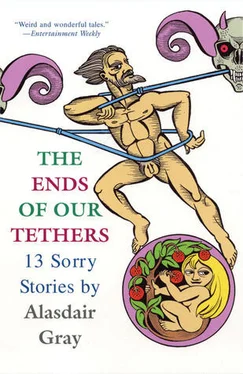“What’s wrong with it?”
“It’s years out of date. Ten or twenty years out of date.”
“Male clothing doesn’t date like women’s does.”
“That shows you know nothing about it.” Yet she was generous and I had no objection to the new clothes she bought me: they always fitted well and were smart without being eccentric. But I was appalled when I came home one evening and found she had given all my former clothes to Oxfam, so appalled that I packed the few things I needed with the firm intention of leaving that house forever, though invitations had been posted for our wedding reception a fortnight hence. She had a master key and used it to lock me in. I managed to open a window and would have jumped out but her anger suddenly turned to a terrible storm of weeping and pleading. I had never before seen anyone in that state. I could not possibly leave her in it, so stayed and comforted her until we were friends again and got married after all.
Through number 2 I met people whose lives seemed jumpier and more erratic than I was used to: journalists, broadcasters, women who managed their own shops. All had children by former husbands or wives and lived with partners they seemed to leave or change without conspicuous fuss. Despite her ex-husband’s warning I am sure number 2 was not promiscuous while we lived together. She enjoyed declaring her feelings too openly to hide them for long and in five or six years confessed only twice to having brief affairs with other men. These confessions were made partly to annoy me so I annoyed her back by saying I did not care what she did when I could not see it, which was true. Yet despite our main faithfulness to each other, and the lovely tricks and eccentricities by which she turned ordinary meals and events into pleasant occasions, every month came a huge explosion of grief and rage which made a hell of that marriage. They were provoked by trivialities that I could never foresee and can now hardly remember. I think her love of drama was the main cause. While stooping to lift a fallen pencil at work I struck the corner of a desk with my brow and raised a small lump. When I got home she screamed, “What’s happened to your face? You look horrible!”
I could not take that seriously and a week later referred to it as proof of how easily she was upset. She laughed and said, “I wasn’t upset at all! I just felt wicked and wanted to annoy you.”
But the longer we lived together the more explosive our quarrels became until I was pointing out, again and again, that the misery we gave each other was far greater than the comfort. But whenever I packed up to leave, again and again came appalling grief of the sort that had got me marrying her after seeing it was a bad idea.
She was fond of children, the younger the better, and was visiting someone with a new baby one evening when I decided to eat out alone. In the restaurant I met friends of number 2 with a woman I had never seen before. They invited me to join them, jocularly remarking that this was the first time they had ever seen me without a wife. I enjoyed that meal, drank more than my usual glass of wine and found the friends were leaving me with the stranger. “Don’t worry, we won’t clype,” they said, pretending to creep away on tiptoe. So I spent that night in the stranger’s home.
I call my wives by number instead of name to shield them from readers who may meet them, and I also disguise them with a few inaccuracies. With this in mind let me say that number 3 was a senior hospital nurse of a sort that used to be called matrons. She was as tall as me but so slimly built that she looked taller, with a delicate oval head and a thatch of blonde hair cut very short. More attractive than her beauty was her quietness. When not sleeping or sulking number 2 talked almost incessantly, often with questions that needed highly detailed answers. Number 3 used few words, never gossiped and seldom asked questions. Being unused to long silences I found hers disconcerting at first and tried to fill them with entertaining chatter but she murmured, “You don’t need to talk to me.”
Before I left next morning we had come to one of the unexpected understandings that have changed my life.
“I want to live with you,” I told her. “I am going straight home to tell my wife that. Have you room for me?”
“That depends on how much you bring with you,” she said with a Mona Lisa smile.
She lived south of the river, not far from Queen’s Park. Returning by bus I had plenty of time to plan what to tell number 2 and to imagine the hideous emotional explosion it would cause. My courage completely failed. I saw I hadn’t the guts to be so cruel and ended by inventing a lie to explain my overnight absence. I found 2 moodily working at her computer. She did not look up or turn round when I explained to her truthfully how, the previous night, I had met the friends who said they would not clype on me, adding only that I had gone home with them for a nightcap and fallen asleep. But she knew the addition was untrue because very early that morning she had phoned them while phoning everybody else she knew in search of me. She asked if I had spent the night with a woman.
“Yes, but nobody you know,” I said. The result was less violent than I had feared. She switched off the machine, bowed her face into her hands and in a muffled voice said she could do no more work that day, though it was Saturday, usually her busiest day. She behaved, and I acted, as if she was suffering from something like the death of a parent, something that left her too numb for outrage. I took her for a walk through the Botanic Gardens and up Kelvindale to the canal towpath. It was a mild, very pleasant spring day. We exchanged a few words about unimportant things, dined in a pub near Anniesland Cross and were returning home before she said, “Do you want to leave me for this woman I don’t know?”
“Yes,” I said.
“If you had said no,” she told me mournfully, “and begged and wept and pleaded like I sometimes do we could have gone on living together. But now I can’t help seeing that you really don’t want me, so it’s goodbye.”
She then wept a little, but very quietly, and that was the end of that because divorce by mutual consent was now as easy in Scotland as in England.
Number 3’s home (where I still live) was the basement and former kitchen quarters of a large Victorian terrace house divided into flats. The front windows looked into a sunken area and a back door opened on to a long narrow garden, a garden number 3 looked after beautifully for she preferred gardening to housework. I never knew a woman who seemed to care less for her home.
It was sparsely furnished with few of the ornaments and knick-knacks most women accumulate. She had lived there fifteen years, long enough to pay off her mortgage on it, but wallpaper and linoleum had obviously been inherited from earlier tenants, while a cumbersome gas cooker and huge earthenware sink with brass taps seemed as old as the building. I wanted to pay for having the kitchen completely modernised but she said firmly, “No, I’ll pay for that. I promised myself a new kitchen ages ago and I know someone who will do the job cheaply.”
I refrained from saying that all jobs done cheaply are done badly. Instead I offered to put in double-glazed windows and have the whole place re-painted, re-papered and carpeted. She agreed to this and let me choose colours and patterns because she wasn’t interested in these things. I was intensely interested because I had decided, with her permission, to make this flat the headquarters of a new business. I was tired of working for the housing department.
When I joined it in the early seventies Glasgow was still a partly socialist city state owning its own lighting, transport, water and schooling. It was the largest landlord of public housing outside London and proud of the fact, because John Wheatley, a Glasgow politician, had passed the act that made local government housing possible. By the 1980s central government pressure to privatise public property seemed irresistible, and Glasgow’s ruling Labour party put up no resistance at all. Soon after it became legal for council tenants to buy their houses the council appointed a housing chief who publicly announced that Glasgow city council was the biggest owner of slum property in Britain. We in his department looked forward with great interest to his remedy. After a few months he resigned the post and started an agency helping private housing companies to buy local government property. Having had access to municipal housing records he knew, of course, the properties people with money would most want to buy. This would once have been thought a disreputable if not exactly criminal act, but now people in authority accepted such doings with a smile or a shrug, so I decided to do something similar. The department had retrained me in computer technology, so I knew it was now possible to run a professional consultancy without many filing cabinets and a secretary. Number 2 had also shown me that an office could be run from home. Number 3 had no objection to me setting up my desk and machine in what was then our living room.
Читать дальше












